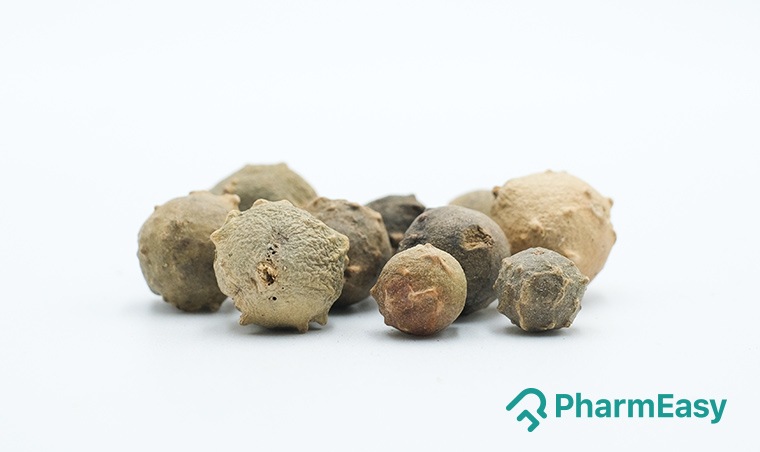Majuphal (Gall Nuts): Uses, Benefits, Precautions & More!
By Dr Anuja Bodhare +2 more

Get,

to manage your symptom
Get your,


4 Cr+ families
benefitted

OTP sent to 9988776655



You’ve successfully subscribed to receive
doctor-approved tips on
Whatsapp

Get ready to feel your best.

Hi There,
Download the PharmEasy App now!!


Register to Avail the Offer
Send OTPBy continuing, you agree with our Privacy Policy and Terms and Conditions

Hi There,
Sign up on PharmEasy now!!
Trusted by 4 crore+ families

OTP sent to 9988776655



You have unlocked 25% off on medicines




Code: NU25

Comments


Leave your comment here
By Dr Anuja Bodhare +2 more
Table of Contents
Majuphal is a type of outgrowth that forms on the young twigs of dyer’s oak tree Quercus infectoria. It is generally called Oak galls or Gall nut in English. It is formed because of the deposition of eggs of a type of gall wasp. The female wasp punctures the bark of twigs and lays the eggs inside the shoot. This process causes a vegetative outgrowth to form around the larva that develops from the eggs, resulting in the development of galls. The galls are an excellent ingredient of various herbal remedies. The galls continue to grow until the eggs hatch and larvae reach maturity. Preferably, the galls must be collected and dried before the insect emerges1.

Did you know?
In Asian countries, Majuphal has been a well-known plant product for its medicinal value to treat various inflammatory diseases and infections since ancient times2. Some of the beneficial properties of Majuphal are as follows:

Majuphal may have an excellent anti-inflammatory and antioxidant property that might make it a good candidate to treat wounds due to bacterial infections. It can be used as a dental powder to treat toothache and gingivitis. The extract from the Majuphal (oak galls) has been used for centuries as an astringent to treat wounds. The studies2 available seem insufficient to validate these claims therefore consult an ayurvedic physician before taking majuphal for it’s benefit for wounds.

Majuphal may have effective against single or multi-drug resistant parasitic infections caused due to parasites like Leishmania major, Blastocystis spp, and Entamoeba histolytica. The extract of Majuphal, when applied to the affected site, significantly reduces cutaneous infections like leishmaniasis, amoebiasis, and blastocystis3. You should consult a doctor for prescription and guidance.
Based on my readings of Unani and integrative medicine, I have seen that Oak Gall might have potential use in the management of intertrigo, impetigo, eczema, haemorrhages, chronic diarrhoea, and dysentery9.
Dr. Rajeev Singh, BAMS

Candidiasis is one of the significant life-threatening infections in women caused due to a yeast named Candida. Majuphal may help in many parts of the world for postpartum care and treatment of various infections caused due to the Albicans and non-Albicans species of Candida, which are the emerging causes of candidiasis. According to a study4 Majuphal extract is effective against various bacterial and fungal infections. Further studies are needed to establish the claim of the effect of majuphal for this effect against candidiasis and postpartum care. It is best to consult a doctor.
In a study I came across, researchers investigated the effects of Oak Gall extract on women facing vaginal relaxation. The findings revealed that using a topical gel containing Oak Gall extract may help with various issues, including achieving increased vaginal tightness, enhanced vaginal lubrication, and reduced vaginal dryness8.
Dr. Siddharth Gupta, B.A.M.S, M.D (Ayu)

The root extracts from Quercus infectoria or the dyer’s oak have been proven to have anti-diabetic effects as per the studies conducted in the laboratory. The extract was found to induce insulin production and release, which reduced the blood sugar levels in diabetic rats. Further investigations may be necessary before its use in humans, but this is one of the ayurvedic medicines currently in research5. Though there are studies showing the benefits of majuphal in various conditions, these are insufficient. There is a need for further studies to establish the true extent of the benefits of majuphal on human health. Furthermore, every person may respond differently to these herbs. Therefore, it is important to consult a doctor before using majuphal for any medical condition.
Majuphal or the oak galls can be either cooked, dried or roasted and powdered7:
You must consult a qualified doctor before taking any herbal supplements. Do not discontinue or replace an ongoing treatment of modern medicine with an ayurvedic/herbal preparation without consulting a qualified doctor.
Also Read: Nirgundi: Benefits, Uses, Side Effects & More!
Care must be taken while harvesting the galls at the right time to retain the soft inner tissue with deep greenish-yellow colour and a very astringent taste followed by a sweet aftertaste1.
No information is available on precautions to be followed while using Majuphal. However, you must consume majuphal as per advise of your doctor only never try to self-medicate. He will guide you for suitable form and dose.
Also Read: Rambutan: Uses, Benefits, Side Effects, and More By Dr. Smita Barode
There is a lack of sufficient data regarding the interaction of majuphal with any other drugs. Therefore, consult a doctor before taking it especially if you are on medication are receiving treatment for any condition.
Based on my understanding, I have learned that Oak Gall is known for its powerful astringent and styptic properties, primarily due to its tannin content. This might make it useful in fending off infections of the oral cavity10.
Dr. Smita Barode, B.A.M.S, M.S.
Also Read: Amaltas (Golden Shower Tree): Uses, Benefits, Side Effects & More!
Majuphal extract is a beneficial medication for postpartum care. It is one of the commonly used remedies to fight the bacterial or fungal infections that may occur in women after delivery4. However, the postpartum care may need medical supervision and diagnosis. Consult a qualified doctor for the treatment of any such conditions.
Yes, Majuphal’s powder can be mixed with water and applied to the breast to treat wounds6. However, more human studies are needed to estimate the extent to which it will be beneficial for human health. It is better to consult a doctor for advice.
Majuphal powder could be mixed with water to treat haemorrhoids. It can be combined with the powdered rind of pomegranate to manage anal fissures6. These activities, however, are yet to be proved in humans. Thus talk to your ayurvedic physician before using anything on your own.
Majuphal is known by different vernacular names: Majuphala, (Bengali), Quzat (Arabic), Maayaaphala (Ayurvedic), Gall Nut, Oak Galls, Magic Nuts, (English), Muphal (Hindi), Gala (Latin), Mazu (Persian), Mashikai (Tamil), Machikaya (Telgu) and Mazu (Urdu)1
Disclaimer: The information provided here is for educational/awareness purposes only and is not intended to be a substitute for medical treatment by a healthcare professional and should not be relied upon to diagnose or treat any medical condition. The reader should consult a registered medical practitioner to determine the appropriateness of the information and before consuming any medication. PharmEasy does not provide any guarantee or warranty (express or implied) regarding the accuracy, adequacy, completeness, legality, reliability or usefulness of the information; and disclaims any liability arising thereof.
Links and product recommendations in the information provided here are advertisements of third-party products available on the website. PharmEasy does not make any representation on the accuracy or suitability of such products/services. Advertisements do not influence the editorial decisions or content. The information in this blog is subject to change without notice. The authors and administrators reserve the right to modify, add, or remove content without notification. It is your responsibility to review this disclaimer regularly for any changes.
Comments

Leave your comment...

View all comments(1)
You may also like
can we eat this as a powder? mixed with phtkari powder to get rid of lumps in body?